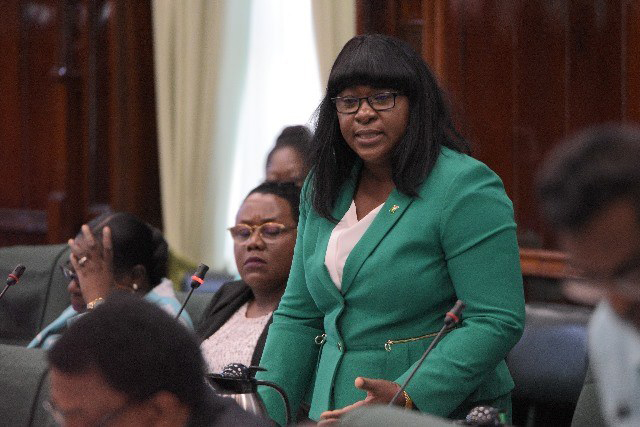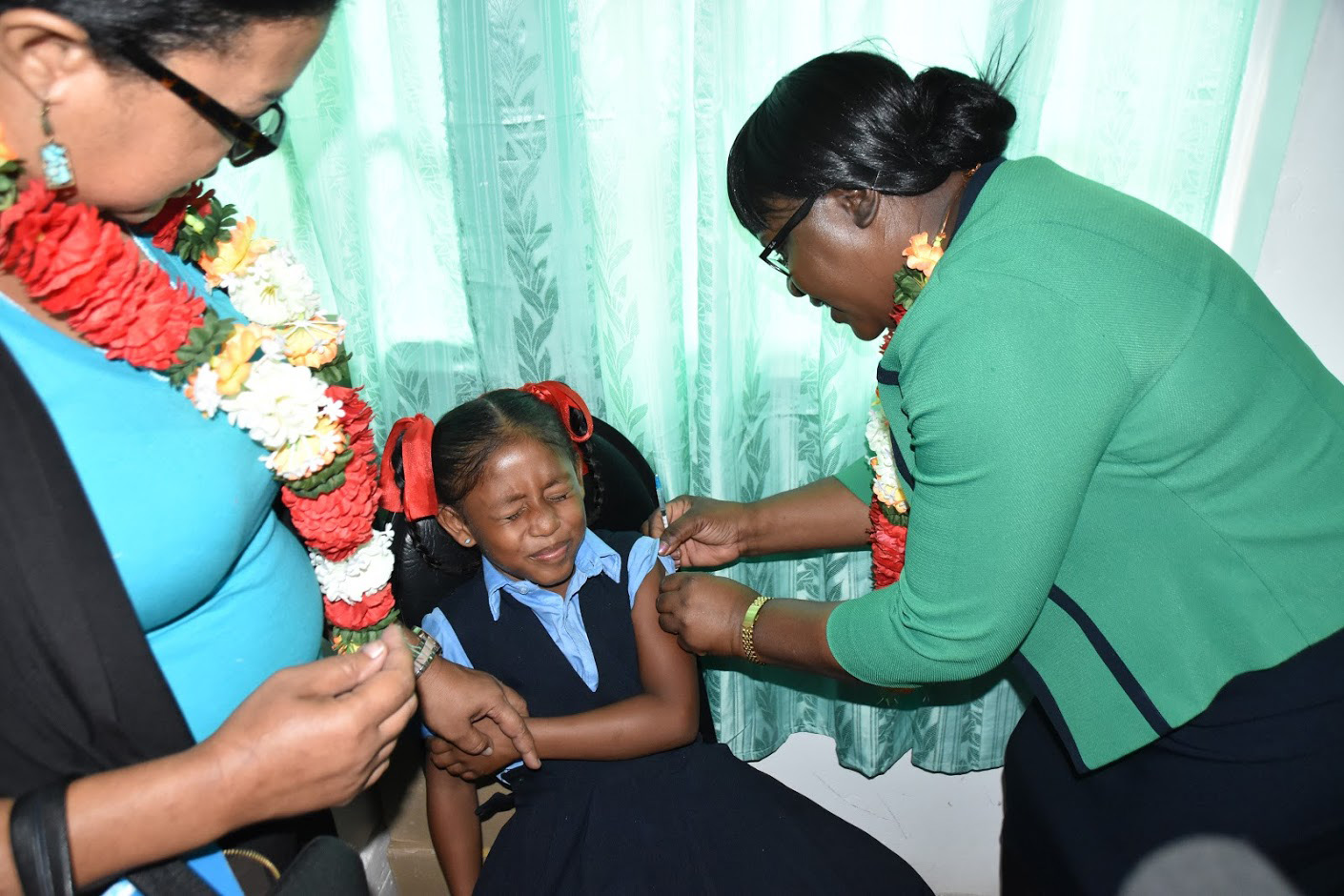The national HPV vaccination campaign, currently being undertaken with the help of Gavi, the Vaccine Alliance, is expected to yield a significant reduction in cervical cancer cases, according to Minister within the Ministry of Public Health Dr. Karen Cummings, who maintains that the vaccines are safe.
Concerns have been raised about the funding behind the initiative and the safety of the vaccine, which is being administered to young girls countrywide. However, although the campaign began this year, the administration of the vaccine was first piloted under the former PPP/C administration, from 2012 to 2014, during which time some 21,600 vaccines were administered to girls between the ages of 11 and 13 in regions 3, 4, 5 and 6.
However, Dr. Cummings revealed that while that programme saw very high coverage for the administration of the first dose of the vaccine, there were high drop-out rates for the two subsequent doses based on “multiple challenges from the media as well as parents.”

“This vaccine was tested for at least 15 years before the company, Merck, was given approval in 2006 by the [United States] Federal Drug Administration to produce and sell this vaccine. To date, all research done to test the safety of the vaccine has not indicated that there is any scientific evidence to support clams of damaging side effects or even death,” Dr. Cummings said recently in response to questions from Stabroek News.
Asked about the funding for the initiative, which was launched in October, Dr. Cummings revealed that in 2016 the Public Health Ministry in collaboration with the ministries of Education and Finance approached the Board of Directors of Gavi for support for the countrywide administration of the vaccine.
“This proposal was approved and the country benefitted from support from GAVI Alliance to purchase vaccines for one cohort as well as half price for all other vaccines to be purchased as well as an introduction grant of US$100,000,” the minister said.
Gavi, formerly the GAVI Alliance, was created in 2000. It describes itself as a Global Vaccine Alliance, bringing together public and private sectors with the shared goal of creating equal access to new and underused vaccines for children living in the world’s poorest countries.
Recently, four concerned citizens, Sherlina Nageer, Karen de Souza, Andaiye, Charlene Wilkinson and Mark Jacobs, publicly called for the halt of the vaccination campaign, out of concern about “the wellbeing of women and children in Guyana.”
In a joint letter, which was published in the November 3 edition of Stabroek News, they highlighted significant harmful side effects from the vaccine that parents of girl children need to be made aware of and noted that the ministry had built its campaign around people’s fear of cancer, without any proper public consultation or discussion about the risks of the vaccine.
“We believe that women and girls must be provided with all the available information so they can be empowered to make the best decision for themselves and their families—not just be browbeaten and bamboozled by the authorities or those who seem to have more knowledge than they do,” their letter said.
They argued that promoting regular sexual health checkups and cancer screenings, such as PAP smears and VIA testing (which have no harmful side effects) are a far more efficient and effective use of the scarce resources of the ministry and would have a greater long term impact in preventing and reducing cervical cancer among Guyanese women.
“We urge the [Ministry of Public Health] to dedicate its efforts and attention to that front instead and would willingly work with them at such time,” they added. According to Dr. Cummings, the vaccination initiative is as a result of recommendations from the Pan American Health Organization (PAHO) Regional Advisory Group on Immunization as a well as other international partners in immunization, such as the Centre for Disease Control (CDC), the United Nations Children Fund (UNICEF), and Caricom etc. Guyana, she said, will be added to the 77 countries worldwide that have already introduced the vaccine to date. Dr. Cummings noted that the HPV vaccine is Gardasil, which targets four types of HPV—6, 11, 16 and 18—that cause genital warts, cervical cancer, penile cancer, oropharyngeal warts as well as anal warts.
She referred to numerous studies, including one that indicated that genital warts have now become rare in young Australian women and heterosexual men seven years after the launch of the national HPV vaccination programme, although they remain common in men who have sex with men.
It was noted, however, that it is a bit early to determine the effect on cervical cancer based on the causative factor of the cancer. However, it is expected that within the next 10 years there will be a reduction that is statically significant enough to be considered an impact.
Further, Dr. Cummings stated that there are many articles that have been published about the damaging effects of the HPV vaccine but to date there is no scientific evidence to support them.
She added that the use of vaccines that prevent the development of cervical cancer has been proven to be the most cost effective long term intervention for cancer, especially when the cost per dose, which is US$4.50, is compared with the cost for treating cancer. “All decisions to support the introduction of this vaccine were made based on the scientific evidence of the introduction and results [in] other populations. Our own pilot is evidence that there are no harmful effects to our population since we haven’t had any reports of life threatening side effects,” Dr. Cummings said.
She further noted that collaboration continues on the part of her ministry to address cervical cancer in a comprehensive manner and discussions have already started with organizations such as the International Federation of Obstetrics and Gynecology as it relates to capacity building within the country, from training of personnel to the introduction of new testing methods as well as upgrading the Pathology Department to provide more sophisticated testing; and treatment available for cancer patients with special emphasis on new treatment methods, end of life care as well as psychosocial support for family members of these patients
“The joint efforts of the Ministry of Public Health and the Ministry of Education will continue in the promotion of healthier lifestyles among in and out of school youths so that there can be a reduction in sexually transmitted infections, teenage pregnancies, obesity as well as injuries, both intentional and unintentional,” the minister said.






